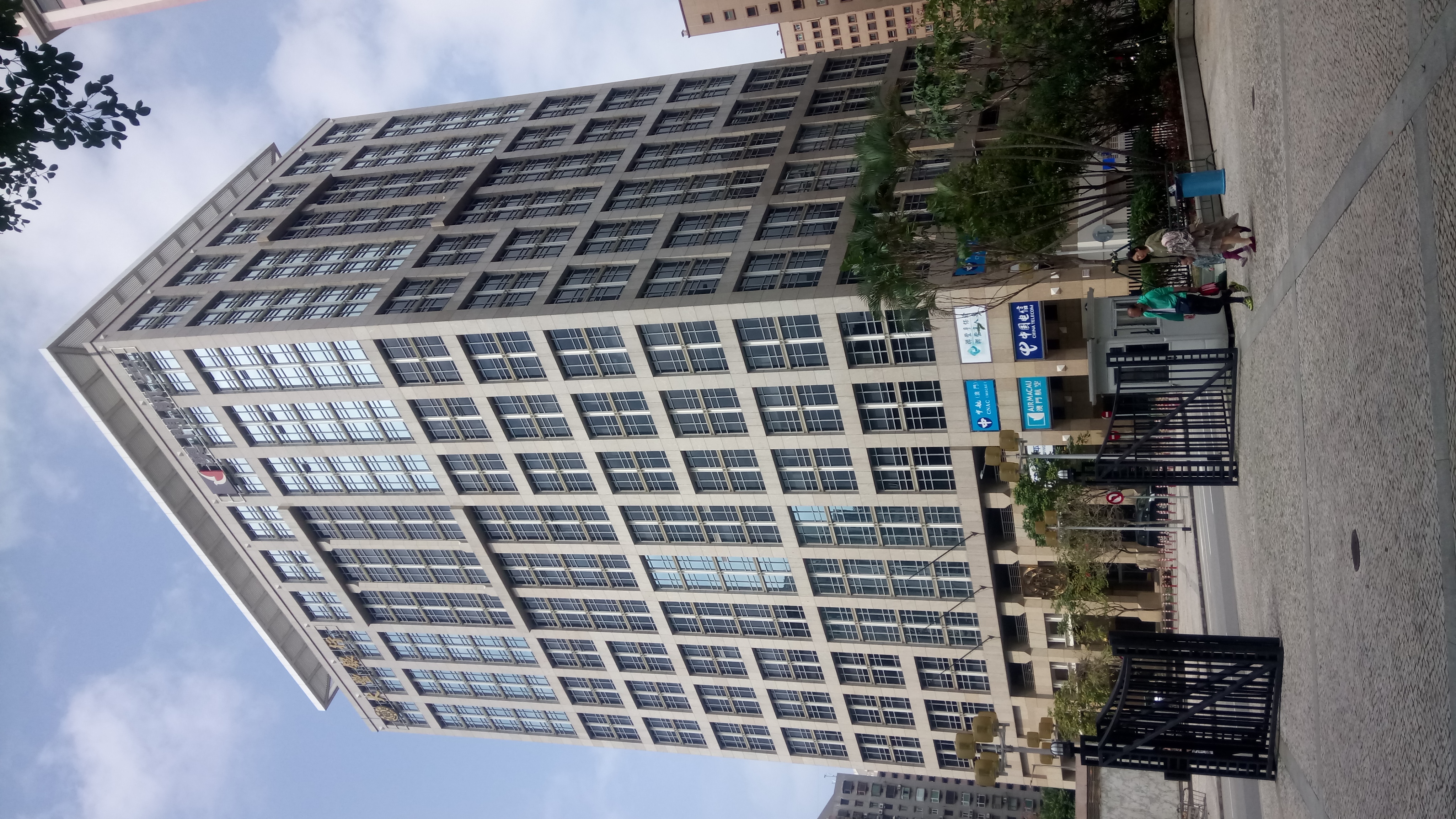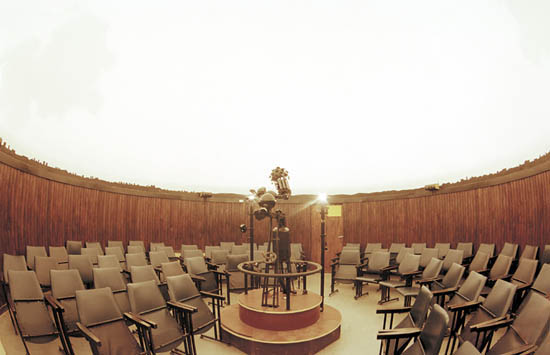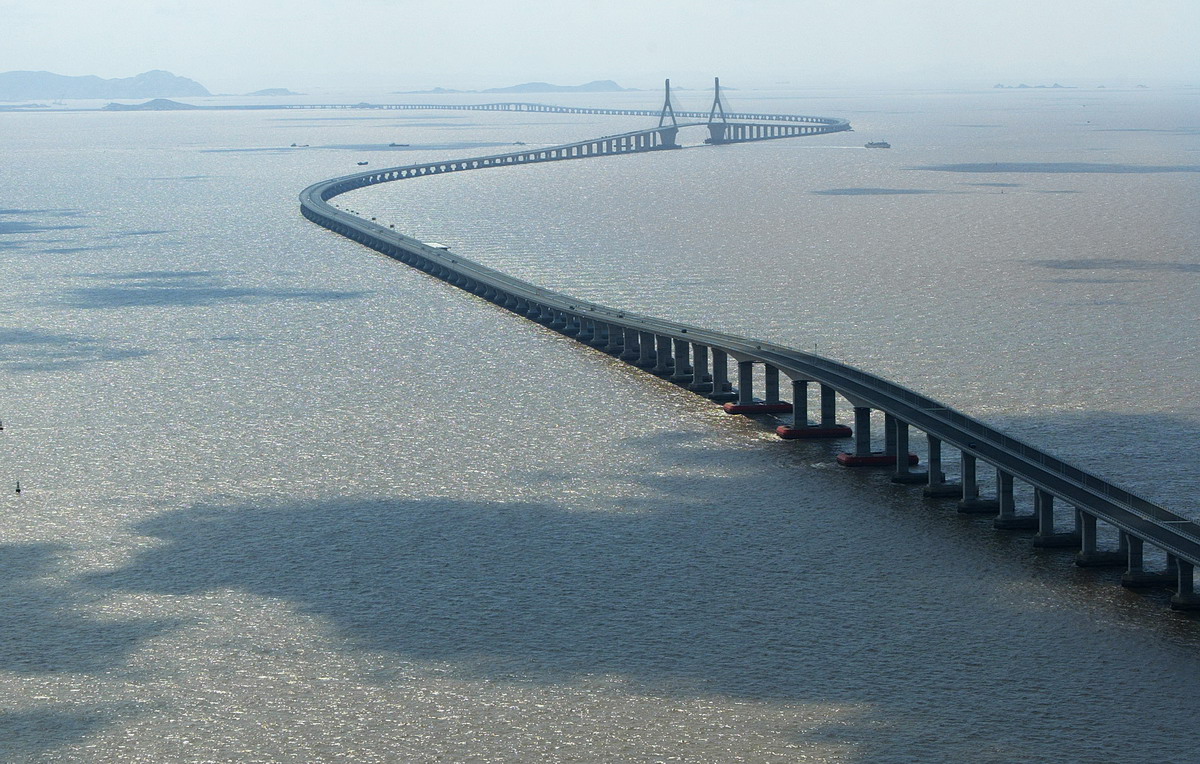|
Macao Science Center
The Macao Science Center also known as Macau Science Center (MSC; ; pt, Centro de Ciência de Macau) is a science center in Sé, Macau, China. The main building has a distinctive, asymmetrical, conical shape with a spiral walkway and a large atrium inside. Galleries lead off the walkway, mainly consisting of interactive exhibits aimed at science education. There is also a planetarium with 3D projection facilities and Omnimax films. The building is in a prominent position by the sea and is now a landmark of Macau. It is visible when arriving on the ferry from Hong Kong. History The project to build the science center was conceived in 2001 and completed in 2009. The building was designed by Pei Partnership Architects in association with I. M. Pei and construction started in 2006. The structural engineer was Leslie E. Robertson Associates. The center was opened in December 2009 by Chinese President and General Secretary of the Communist Party Hu Jintao. The center caug ... [...More Info...] [...Related Items...] OR: [Wikipedia] [Google] [Baidu] |
Sé, Macau
Sé is a southeast Freguesia (Macau), civil parish ( pt, freguesia) in the Macau Peninsula of Macau. It is the second largest peninsular district in Macau after the civil parish of Freguesia de Nossa Senhora de Fátima (Macau), Nossa Senhora de Fátima. The parish area is named for the Igreja da Sé (Macau), Igreja da Sé. This parish was one of five in the former Municipality of Macau, one of Macau's two municipalities that were abolished on 31 December 2001 by Law No. 17/2001, following the 1999 transfer of sovereignty over Macau from Portugal to China. While their administrative functions have since been removed, these parishes are still retained nominally. Its western part is the historic financial center of Macau. Praia Grande Central Business District () is in the south-central part of the district. All banks (over 20) in Macau have offices here. There are numerous quality restaurants, 4-star and 5-star hotels in this district. High-rise buildings exist on the eastern ZAPE ... [...More Info...] [...Related Items...] OR: [Wikipedia] [Google] [Baidu] |
People's Daily
The ''People's Daily'' () is the official newspaper of the Central Committee of the Chinese Communist Party (CCP). The newspaper provides direct information on the policies and viewpoints of the CCP. In addition to its main Chinese-language edition, the ''People's Daily'' is published in multiple languages. History The paper was established on 15 June 1948 and was published in Pingshan, Hebei, until its offices were moved to Beijing in March 1949. Ever since its founding, the ''People's Daily'' has been under direct control of the CCP's top leadership. Deng Tuo and Wu Lengxi served as editor-in-chief from 1948 to 1958 and 1958–1966, respectively, but the paper was in fact controlled by Mao Zedong's personal secretary Hu Qiaomu. During the Cultural Revolution, the ''People's Daily'' was one of the few sources of information from which either foreigners or Chinese could figure out what the Chinese government was doing or planning to do. During this period, an editorial in t ... [...More Info...] [...Related Items...] OR: [Wikipedia] [Google] [Baidu] |
IMAX Venues
IMAX is a proprietary system of high-resolution cameras, film formats, film projectors, and theaters known for having very large screens with a tall aspect ratio (approximately either 1.43:1 or 1.90:1) and steep stadium seating. Graeme Ferguson, Roman Kroitor, Robert Kerr, and William C. Shaw were the co-founders of what would be named the IMAX Corporation (founded in September 1967 as Multiscreen Corporation, Limited), and they developed the first IMAX cinema projection standards in the late 1960s and early 1970s in Canada. IMAX GT is the large format as originally conceived. It uses very large screens of and, unlike most conventional film projectors, the film runs horizontally so that the image width can be greater than the width of the film stock. It is called a 70/15 format. It is used exclusively in purpose-built theaters and dome theaters, and many installations limit themselves to a projection of high quality, short documentaries. The high costs involved in the ... [...More Info...] [...Related Items...] OR: [Wikipedia] [Google] [Baidu] |
Planetaria In China
A planetarium ( planetariums or ''planetaria'') is a theatre built primarily for presenting educational and entertaining shows about astronomy and the night sky, or for training in celestial navigation. A dominant feature of most planetariums is the large dome-shaped projection screen onto which scenes of stars, planets, and other celestial objects can be made to appear and move realistically to simulate their motion. The projection can be created in various ways, such as a star ball, slide projector, video, fulldome projector systems, and lasers. Typical systems can be set to simulate the sky at any point in time, past or present, and often to depict the night sky as it would appear from any point of latitude on Earth. Planetaria range in size from the 37 meter dome in St. Petersburg, Russia (called “Planetarium No 1”) to three-meter inflatable portable domes where attendees sit on the floor. The largest planetarium in the Western Hemisphere is the Jennifer Chalsty Plan ... [...More Info...] [...Related Items...] OR: [Wikipedia] [Google] [Baidu] |
Science And Technology In China
Science and technology in China have developed rapidly during the 1980s to 2010s, and major scientific and technological achievements have been made since the 1980s. From the 1980s to the 1990s, the Chinese government successively launched the " 863 Plan" and the "Strategy for Rejuvenating the Country through Science and Education", which greatly promoted the development and progress of China's science and technology. The Chinese government has placed emphasis through funding, reform, and societal status on science and technology as a fundamental part of the socio-economic development of the country as well as for national prestige. China has made rapid advances in areas such as education, infrastructure, high-tech manufacturing, academic publishing, patents, and commercial applications and is now in some areas and by some measures a world leader. China is now increasingly targeting indigenous innovation and aims to reform remaining weaknesses. Per the Global Innovation Index ... [...More Info...] [...Related Items...] OR: [Wikipedia] [Google] [Baidu] |
Tourist Attractions In Macau
Tourism is travel for pleasure or business; also the theory and practice of touring, the business of attracting, accommodating, and entertaining tourists, and the business of operating tours. The World Tourism Organization defines tourism more generally, in terms which go "beyond the common perception of tourism as being limited to holiday activity only", as people "travelling to and staying in places outside their usual environment for not more than one consecutive year for leisure and not less than 24 hours, business and other purposes". Tourism can be domestic (within the traveller's own country) or international, and international tourism has both incoming and outgoing implications on a country's balance of payments. Tourism numbers declined as a result of a strong economic slowdown (the late-2000s recession) between the second half of 2008 and the end of 2009, and in consequence of the outbreak of the 2009 H1N1 influenza virus, but slowly recovered until the COVID-19 ... [...More Info...] [...Related Items...] OR: [Wikipedia] [Google] [Baidu] |
Science Museums In China
Science is a systematic endeavor that Scientific method, builds and organizes knowledge in the form of Testability, testable explanations and predictions about the universe. Science may be as old as the human species, and some of the earliest archeological evidence for scientific reasoning is tens of thousands of years old. The earliest written records in the history of science come from Ancient Egypt and Mesopotamia in around 3000 to 1200 Common Era, BCE. Their contributions to mathematics, astronomy, and medicine entered and shaped Greek natural philosophy of classical antiquity, whereby formal attempts were made to provide explanations of events in the Universe, physical world based on natural causes. After the fall of the Western Roman Empire, knowledge of History of science in classical antiquity, Greek conceptions of the world deteriorated in Western Europe during the early centuries (400 to 1000 CE) of the Middle Ages, but was preserved in the Muslim world during the ... [...More Info...] [...Related Items...] OR: [Wikipedia] [Google] [Baidu] |
Buildings And Structures In Macau
A building, or edifice, is an enclosed structure with a roof and walls standing more or less permanently in one place, such as a house or factory (although there's also portable buildings). Buildings come in a variety of sizes, shapes, and functions, and have been adapted throughout history for a wide number of factors, from building materials available, to weather conditions, land prices, ground conditions, specific uses, prestige, and aesthetic reasons. To better understand the term ''building'' compare the list of nonbuilding structures. Buildings serve several societal needs – primarily as shelter from weather, security, living space, privacy, to store belongings, and to comfortably live and work. A building as a shelter represents a physical division of the human habitat (a place of comfort and safety) and the ''outside'' (a place that at times may be harsh and harmful). Ever since the first cave paintings, buildings have also become objects or canvasses of much artistic ... [...More Info...] [...Related Items...] OR: [Wikipedia] [Google] [Baidu] |
Museums In Macau
A museum ( ; plural museums or, rarely, musea) is a building or institution that cares for and displays a collection of artifacts and other objects of artistic, cultural, historical, or scientific importance. Many public museums make these items available for public viewing through exhibits that may be permanent or temporary. The largest museums are located in major cities throughout the world, while thousands of local museums exist in smaller cities, towns, and rural areas. Museums have varying aims, ranging from the conservation and documentation of their collection, serving researchers and specialists, to catering to the general public. The goal of serving researchers is not only scientific, but intended to serve the general public. There are many types of museums, including art museums, natural history museums, science museums, war museums, and children's museums. According to the International Council of Museums (ICOM), there are more than 55,000 museums in 202 countries ... [...More Info...] [...Related Items...] OR: [Wikipedia] [Google] [Baidu] |
Museums Established In 2009
A museum ( ; plural museums or, rarely, musea) is a building or institution that cares for and displays a collection of artifacts and other objects of artistic, cultural, historical, or scientific importance. Many public museums make these items available for public viewing through exhibits that may be permanent or temporary. The largest museums are located in major cities throughout the world, while thousands of local museums exist in smaller cities, towns, and rural areas. Museums have varying aims, ranging from the conservation and documentation of their collection, serving researchers and specialists, to catering to the general public. The goal of serving researchers is not only scientific, but intended to serve the general public. There are many types of museums, including art museums, natural history museums, science museums, war museums, and children's museums. According to the International Council of Museums (ICOM), there are more than 55,000 museums in 202 cou ... [...More Info...] [...Related Items...] OR: [Wikipedia] [Google] [Baidu] |
List Of Museums In Macau
A ''list'' is any set of items in a row. List or lists may also refer to: People * List (surname) Organizations * List College, an undergraduate division of the Jewish Theological Seminary of America * SC Germania List, German rugby union club Other uses * Angle of list, the leaning to either port or starboard of a ship * List (information), an ordered collection of pieces of information ** List (abstract data type), a method to organize data in computer science * List on Sylt, previously called List, the northernmost village in Germany, on the island of Sylt * ''List'', an alternative term for ''roll'' in flight dynamics * To ''list'' a building, etc., in the UK it means to designate it a listed building that may not be altered without permission * Lists (jousting), the barriers used to designate the tournament area where medieval knights jousted * ''The Book of Lists'', an American series of books with unusual lists See also * The List (other) * Listing (di ... [...More Info...] [...Related Items...] OR: [Wikipedia] [Google] [Baidu] |
Macau Science And Culture Centre
The Macau Scientific and Cultural Centre (, I.P.), endowed with administrative autonomy and individual capital, is a public institute integrated within the internal administration of the Portuguese state, under the supervision of the Ministry of Science, Technology and Higher Education. The centre's mission is to produce, promote and disseminate knowledge about Macau as a platform between Portugal and the People's Republic of China, as well as between Europe and Asia. The centre is also a forum dedicated to studying and teaching the Chinese language and China's culture and history, and a centre for scientific research and ongoing and advanced training, on international relations between Portugal and China, and between Europe and Asia. The centre was created in 1995 by the initiative of the government in Macau in cooperation with the government of Portugal, and was inaugurated in 1999. The centre's activities are developed within three main areas: * Research (international and inter ... [...More Info...] [...Related Items...] OR: [Wikipedia] [Google] [Baidu] |





